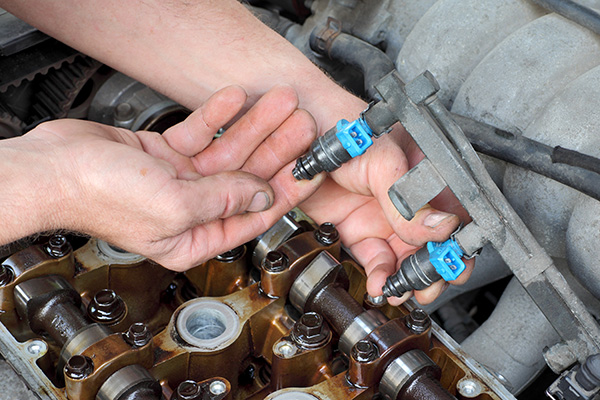
Your car’s fuel system ensures overall performance, power, and fuel efficiency. Without regular attention to the fuel system, you could find yourself dealing with costly repairs, reduced efficiency, or even engine failure. So, how can you keep your fuel system in top shape? From maintaining a clean fuel filter to using quality fuel additives, let’s see what it takes to extend the life of your car’s fuel system and ensure a worry-free drive.
Why Is Fuel System Maintenance Important
The fuel system works by delivering gasoline from the tank to the engine, where it’s burned to power the car. Over time, dirt, debris, and residue from the fuel itself can clog various components in the system, leading to performance issues. This buildup can cause the engine to work harder than it needs to, reducing both your car’s power and fuel efficiency. Regular maintenance keeps these problems at bay, leading to a healthier engine, better fuel economy, and a smoother ride.
1. Keep Your Fuel Filter Clean
The fuel filter is one of the most crucial parts of the fuel system. It catches dirt, rust, and other particles before they reach the engine, preventing clogs and wear. However, over time, the filter can get clogged, reducing the flow of fuel and straining the engine.
To keep things running properly, the fuel filter should be replaced according to your car’s maintenance schedule, typically every 20,000 to 40,000 miles. If you’re not sure when your fuel filter was last changed, it might be worth checking on it sooner. A new, clean fuel filter means your engine can receive fuel without obstruction, resulting in better performance and fuel efficiency.
2. Use Quality Fuel and Additives
Not all fuel is created equal. Some types of gasoline contain fewer additives, which can allow carbon deposits and other residues to build up in your engine. By using high-quality fuel, you can minimize these deposits, which helps maintain your fuel system over time. In addition, consider using a quality fuel additive every few thousand miles. These additives can help clean the injectors and other fuel system parts, keeping everything in prime working order.
Fuel additives can be especially helpful if you frequently drive in stop-and-go traffic or make lots of short trips, as these driving habits can lead to greater buildup. However, don’t overdo it—using too much additives can have adverse effects. Just follow the instructions, and your car’s fuel system will thank you.
3. Watch Out for Fuel Injector Issues
Fuel injectors are responsible for spraying fuel into the engine, where it mixes with air and ignites to produce power. Over time, these injectors can become clogged with carbon and other residues, leading to poor performance, rough idling, or hard starting. If left untreated, a clogged fuel injector can even cause misfires, affecting your engine’s overall health.
One way to help keep injectors clean is by using a fuel system cleaner as mentioned earlier. For more stubborn issues, however, a professional fuel injector cleaning service may be required. If you notice symptoms like rough idling or decreased fuel efficiency, it may be time for an injector inspection.
4. Don’t Run on Empty
Driving until the gas light comes on might seem harmless, but running on a nearly empty tank can actually harm your fuel system. When your fuel level is low, your fuel pump has to work harder to send gas to the engine, which can lead to premature wear. Moreover, the debris and sediments that settle at the bottom of the tank are more likely to be sucked into the fuel system when the tank is nearly empty, increasing the risk of clogging.
To protect your fuel system and fuel pump, try to keep your tank at least one-quarter full at all times. Not only will it reduce wear on your fuel pump, but it also decreases the chance of contaminants getting pulled into the system.
5. Schedule Regular Fuel System Inspections
Regular inspections by a professional can help identify any fuel system problems before they lead to more serious issues. A certified technician can check everything from the fuel pump and injectors to the lines and filters, ensuring that your system is working efficiently. Routine maintenance, such as fuel filter replacements and injector cleaning, can be performed during these visits, saving you from costly repairs down the line.
Whether it’s noticing a drop in fuel economy or hearing strange sounds from the engine, early detection of fuel system issues is key to maintaining a healthy vehicle. Consider bringing your car to Precision Import Repair for a comprehensive inspection and maintenance.
6. Be Aware of Your Driving Habits
Believe it or not, your driving habits can also impact the health of your fuel system. Frequent short trips, aggressive acceleration, and prolonged idling can cause greater fuel residue buildup in the engine. By driving more conservatively, you can prevent your fuel injectors and lines from getting clogged as quickly.
Giving your car a chance to reach a higher speed periodically can be beneficial for the fuel system. This allows the engine to warm up thoroughly and can help burn off some of the residue in the injectors.
Concerned about fuel efficiency or engine performance? Contact Precision Import Repair today! We offer a full range of fuel system services, from filter replacements to fuel injector cleaning, all designed to help you get the most out of every mile.